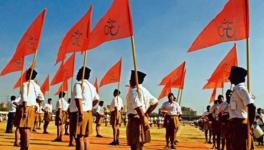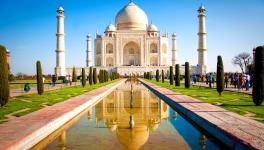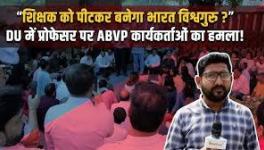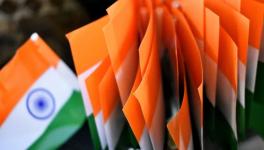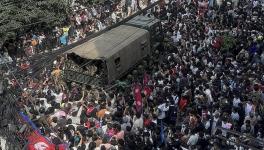True History: Gandhi’s Murder, Godse and RSS
Image Courtesy: Wikimedia Commons
In April, the National Council of Educational Research and Training (NCERT) announced many deletions from school textbooks as per the latest National Curriculum Framework for School Education (NCF) 2023. Parts related to Mughal history, references to the Gujarat communal violence in 2002, and the origin of the caste-varna system also stand deleted, with sections about Mahatma Gandhi’s murder. “His [Gandhi’s] steadfast pursuit of Hindu-Muslim unity provoked Hindu extremists so much that they made several attempts to assassinate Gandhiji…Gandhiji’s death had an almost magical effect on the communal situation in the country… The government of India cracked down on organisations that were spreading communal hatred. Organisations like the Rashtriya Swayamsewak Sangh (RSS) were banned for some time,” said the deleted sections.
How we see these deletions and the accompanying removal of Nathuram Godse’s reference as a Hindu extremist, a Brahmin, needs to be understood.
After a Muslim, Abdul Rashid, murdered Swami Shraddhanand, Gandhi condemned the murder but addressed Rashid as a brother and said he was not the one to blame. Instead, those who created the atmosphere of hate should hold the blame. In the same way, Gandhi and his disciples, Sardar Patel in particular, saw Godse as the manifestation of hatred prevalent in society.
Gandhi was, of course, not there to opine about Godse after his murder. However, his attitude to the dastardly act became apparent when, in 1944, Godse attacked him with a dagger in Panchgani near Pune. The incident occurred when, during a prayer meeting, Godse, “dressed in a Nehru shirt, pyjama and jacket, rushed towards Gandhi. He was brandishing a dagger in his hand and shouting anti-Gandhi slogans. Godse was overpowered…” and Gandhi was saved. In response, Gandhi “asked Godse to spend eight days with him so that they could understand each other. Godse rejected this invitation and was allowed to go by a magnanimous Gandhi.” In both cases, Gandhi’s response seems to have been the same.
As for Gandhi blaming hate as the cause of murder in the case of Swami Shraddhanand, his disciple Patel had the same view and banned the RSS. Some mistakenly believe it was on the insistence of the prime minister Jawaharlal Nehru that the RSS was banned. The communiqué issued by the government on 4 February 1948 is revealing. Patel was the Home Minister at the time.
In the communiqué, the central government said it was banning the RSS to “root out the forces of hate and violence that are at work in our country and imperil the freedom of the Nation and darken her fair name… It has been found that in several parts of the country, individual members of Rashtriya Swayamsevak Sangh have indulged in acts of violence involving arson, robbery, dacoity, and murder and have collected illicit arms and ammunition. They have been found circulating leaflets exhorting people to resort to terrorist methods, to collect firearms, to create disaffection against the government and suborn the police and the military”.
In a letter to the second RSS chief, MS Golwalkar, Patel writes, “All their [RSS members’] speeches were filled with communal poison… As a final result of the poison, the country had to suffer the sacrifice of the invaluable life of Gandhiji. Even an iota of sympathy from the government or the people, no more remained for the RSS. In fact, the opposition grew. Opposition turned more severe when the RSS men expressed joy and distributed sweets after Gandhiji’s death.”
The RSS propagates that the courts lifted this “illegal” ban, but even this is only half true. The paragraph deleted from the NCERT textbook explicitly mentions that the RSS ban was only for some time. Gandhi, Patel, and Nehru all realised hate is more responsible than Godse as an individual for the violence, and this equally applied to the murders of Swami Shraddhanand and Gandhi. While paying lip service to the Mahatma, the RSS continues to do what it began, spreading hate against Muslims and glorifying the old hierarchical society.
The hate Godse imbibed was from the RSS, to begin with. He wrote in Why I Assassinated Mahatma Gandhi: “Having worked for the uplift of the Hindus, I felt it necessary to take part in political activities of the country for the protection of just rights of Hindus. I, therefore, left the Sangh [RSS] and joined Hindu Mahasabha.” He held Mahatma responsible for appeasing Muslims and, thereby, aiding Pakistan’s formation. He joined the Hindu Mahasabha, the only political party raising the Hindutva cause at the time, and became the general secretary of its Pune branch. In due course, he launched a newspaper as founder editor called Agrani (Leader) and later launched another publication, which he named Hindu Rashtra.
Understanding the hate Rashid and Godse imbibed in today’s context means that the youth who are waving lathis, swords, and pistols in religious processions are guilty—but an even bigger share of the blame lies with the indoctrination of hate ideology, hate speeches, and social media posts which constantly blare hate against religious minorities. A brief look at many neighbourhoods would confirm that nationalism mixed with religion is the weapon that is creating and propagating hate. In a way, we are following Pakistan’s path. In that country, Islamist nationalism manufactured hate against Hindus and Christians, resulting in their widespread persecution. In Sri Lanka, Buddhist Sinhala nationalism led to the persecution of Tamil, Muslim and Christian populations.
With NCERT’s deletions, those upholding Hindu nationalism and their advocates are intensifying the hate that has led to many acts of violence and marginalisation of minorities, culminating in expanding ghettoes in many places. Defending the deletions, particularly those related to Gandhi’s murder and the role of Godse and hate-filled ideologies played in it, is yet another attempt to deepen the divisive agenda.
The author is a human rights activist and taught at IIT Bombay. The views are personal.
Get the latest reports & analysis with people's perspective on Protests, movements & deep analytical videos, discussions of the current affairs in your Telegram app. Subscribe to NewsClick's Telegram channel & get Real-Time updates on stories, as they get published on our website.











